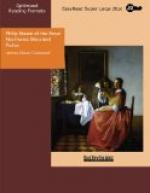By three o’clock he was on the trail again. Breed had spoken truthfully when he said that his dogs were scrubs. There were four of them, two mongrels, one blind huskie, and a mamelute that ran lame. And besides this handicap, Philip found that his own endurance was fast reaching the ebbing point. He had traveled sixty miles in a day and a half, and his legs and back began to show signs of the strain. In spite of this fact, his spirits rose with every mile he placed behind him. He knew that it would be impossible for Isobel and her father to stand the hardship of fast and continued travel. At the most they would not make more than twenty miles in a day, and even with his scrub team he could make thirty, and would probably overtake them at the end of the next day. And then it occurred to him, with a pleasurable thrill, that to find Isobel again on the trail, as he had first seen her, would be a hundred times better than finding her at Lac Bain. He would accompany her and the colonel to Churchill. They would be together for days, and at the end of that time—
He laughed low and joyously, and for a spell he urged the dogs into a swifter pace. That he had correctly estimated the speed of those ahead of him he was convinced, when, two hours later, he came upon the remains of their mid-day camp-fire, nine or ten miles from Lac Bain. It was dark when he reached this point. There were glowing embers still in the fire, and these he stirred into life, adding armfuls of dry wood to the flames. About him in the snow he found the prints of Isobel’s little feet, and in the flood of joy and hope that was sweeping more and more into his life he sang and whistled, and forgot that he was alone in a desolation of blackness that made even the dogs slink nearer to the fire. He would camp here—where Isobel had been only a few hours before. If he traveled hard he would overtake them by the next noon.
But he had underestimated his own exhaustion. After he had put up his tent before the fire he made himself a bed of balsam boughs and tell into a deep sleep, from which neither dawn nor the restless movements of the dogs could awaken him. When at last he opened his eyes it was broad day. He jumped to his feet and looked at his watch. It was nine o’clock, and after ten before he again took up the pursuit of the two sledges. Not until several hours later did he give up hope of overtaking Isobel and her father as he had planned, and he reproved himself roundly for having overslept. The afternoon was half gone before he struck their camp of the preceding evening, and he knew that, because of his own loss of time, Isobel was still as far ahead of him as when he had left Lac Bain.




